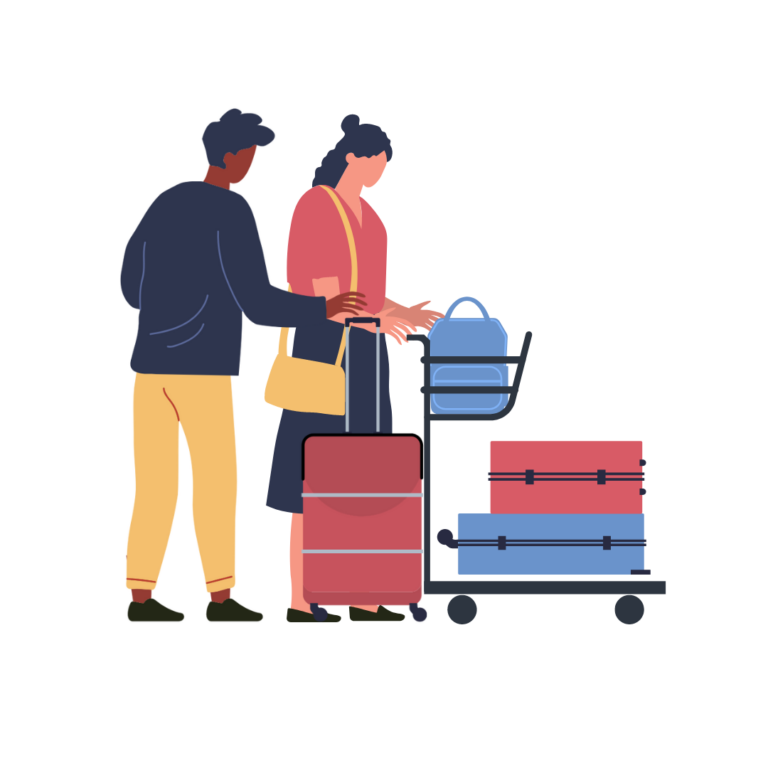Can I claim compensation for a flight delay or cancellation?
Air passenger rights in the United States are closed to being expanded by the Department of Transportation (DOT), more akin to Europe. That doesn’t mean that there aren’t any regulations or policies already in place. The US Department of Transportation (DOT) is the controlling body of federal air passenger rights in the USA. The DOT is responsible for protecting the rights of air passengers and ensuring that airlines comply with federal regulations.

Here are some of the current general rights and regulations enforced by the DOT:
Denied boarding compensation
If you are involuntarily bumped from a flight due to overbooking, you may be entitled to compensation. The amount of compensation depends on factors such as the length of the delay and the price of your ticket.
Tarmac delay rules
The U.S. Department of Transportation (DOT) established rules that limit the amount of time a domestic flight can keep passengers on the tarmac without deplaning. Airlines are generally required to provide food, water, and working restrooms during extended delays.
Delayed and canceled flights
Airlines are required to inform passengers about the reasons for delays and cancellations. This is where US regulations lag behind EU rules.
Baggage handling
Airlines are regulated with regard to lost, damaged, or delayed baggage. Passengers are entitled to compensation for anybaggage issues, up to a limit.
Overbooking
When a flight has more passengers checked-in than there are seats available, airlines must first ask passengers to give up their seats voluntarily, in exchange for compensation before bumping anyone involuntarily. Airlines may offer passengers incentives such as money or vouchers, to volunteer. If a passenger is denied boarding involuntarily, they are entitled to compensation.
Airline passenger already have several rights in place and if it’s up to the DOT, more will be introduced
But it wasn’t always like this. Almost 100 years ago, during the early days of commercial aviation, suddenly there was a need for consumer protection and regulations for the airline industry.
In the 1920s and 1930s, the airline industry was largely unregulated, and airlines were free to set their own prices and policies. This often led to unfair and deceptive practices, such as overbooking flights, delaying flights for hours without providing passengers with food or drinks, and losing passengers’ baggage.
In response to these problems, Congress passed the Civil Aeronautics Act of 1938. This law created the Civil Aeronautics Board (CAB), which was tasked with regulating the airline industry. The CAB set fares and routes for airlines, and it also established some basic passenger rights, such as the right to be informed about flight delays and cancellations.
In the 1970s, the airline industry began to lobby for deregulation. Airlines argued that deregulation would lead to lower fares and more competition. Congress passed the Airline Deregulation Act of 1978, which abolished the CAB and deregulated the airline industry.
While deregulation led to lower fares and more competition, it also led to some airlines becoming more focused on profits than on customer service. This led to a number of problems, such as increased overbooking, longer tarmac delays, and more lost baggage.
In response to these problems, Congress passed a number of laws to protect air passengers.
The DOT has also created a new enforcement office to investigate and prosecute violations of air passenger rights laws.
While air passenger rights in the United States have improved over time, there is still room for improvement.
What are the proposed rule changes for flight compensation?
The proposed rules would address compensation to passengers in the event of a controllable airline cancellation or significant delay, such as a meal or meal voucher, overnight accommodations, ground transportation to and from a hotel, and rebooking for controllable delays or cancellations. Timely customer service during and after periods of widespread flight disruptions would also be addressed. Read all about the proposal.
Am I eligible for compensation now if a flight is delayed or cancelled?
As of now, you can only apply for financial compensation if you fly to or from Europe. Read more about if you are eligible for compensation after a delay or cancellation.
How do our regulations differ from in Europe?
The current airpassenger rights in the US can learn a lot from the EU. Read more about European compensation rules here.
My flight was over sold and I am denied boarding, what are my rights?
If you are denied boarding on a flight departing from the United States, the airline is obligated to compensate you according to the regulations outlined in 14 CFR 250.
The amount of compensation you are entitled to depends on the distance of your flight and the extent of the delay caused by the denial of boarding.
Domestic Flights
-
For delays of 1 to 2 hours, you will receive 200% of the one-way fare to your next stopover, up to a maximum of $775.
-
For delays exceeding 2 hours, you will receive 400% of the one-way fare to your next stopover, up to a maximum of $1,550.
International Flights
-
For delays of 1 to 4 hours, you will receive 200% of the one-way fare to your next stopover, up to a maximum of $775.
-
For delays exceeding 4 hours, you will receive 400% of the one-way fare to your next stopover, up to a maximum of $1,550.